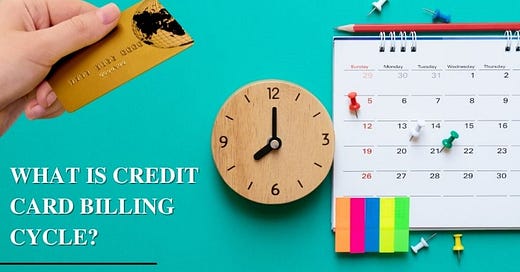Credit Card Billing Cycle: Everything You Need to Know About It
There are a lot of terminologies attached with a credit card like minimum payment, late fees, due date, grace period, billing date, etc. confused which term means what? A credit cardholder must be aware of every term before using a credit card so that he/she can make the most out of a credit card. Not having complete knowledge can keep you away from the endless benefits of a credit card. Get complete insights into the credit card billing cycle in this article.
What is the billing cycle?
In a billing cycle, you get a month to use a credit card to provided credit limit to pay for the transactions and at the end of the cycle, you get a monthly Credit card statement that shows all your transactions that happened in the billing cycle. For example, your credit card bill is generated on the 1st of every month, then your credit card billing cycle will start on the 1st of the previous month. The billing cycle may differ from credit card to credit card.
At the end of the billing cycle, you get a credit card bill on the next day which is known as the billing due date.
After the billing due date, you get 15-20 days of grace period which you can use to pay your credit card without interest charges. After this grace period is elapsed you will be charged interest on the outstanding balance.
How does the billing cycle work?
The billing cycle starts from the day when your credit card gets activated. You get a month to use your credit card upto to the credit card limit after a month you get your credit card bill. Which you are required to pay within 15-25 days, these days are typically known as a grace period. The credit card interest-free period includes your billing cycle plus grace period, during which you will be not charged with any interest on the due amount. After the interest-free period, you will be charged with the late payment fee plus interest charges. You can avoid the late payment charges by paying the minimum due amount.
What is the minimum payment?
After the billing cycle, you get a credit card bill from which you can pay say 5% as the minimum due payment to avoid the late payment charges. However, if you carry the remaining amount from one billing cycle to another then you will be charged with the interest on the remaining amount. The minimum due payment does not guarantee you a lower interest charge rather it attracts high charges. So, it is advisable to clear the due amount in full.
Bottom Line:
To summarise, being responsible while using a credit card is important for your financial stability. It can get strenuous to manage your credit card usage along with maintaining the credit card bill payments and during this, the chances of missing the due dates are higher than you think. It is advisable to register for the auto-debit services so that on every selected date your credit card bill gets deducted from your account. Keeping the Credit card utilization ratio low is another key in building a good credit history and stable financial health. All in all, you need to have a better understanding of your credit card billing cycle.
Comment down your tips on how you manage your credit card billing cycle and how one can maintain stable financial health with a credit card.



